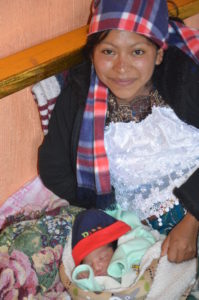Summary of accomplishments because of Ronald McDonald House Charities
Posted: July 31, 2018
No woman should die in Childbirth
A 15-year old girl arrives at the Casa Maternas in Calhuitz. She has just delivered at home but the placenta will not come out. Similarly, Her mother died when she was nine years old of retained placenta and I can read the terror in her eyes.
No woman should die in childbirth. None. Because a maternal death is not only a terrible tragedy and a violation of human rights – it is a tsunami of devastating consequences that accelerates the cycle of disease and poverty. Her children are five times more likely to die, be malnourished, or discontinue their schooling. The the family is twice as likely to disintegrate or fall deeper into poverty.
Nowhere is this truer than among the indigenous Mayan people of Guatemala. They suffer horrific maternal mortality due to a long history of discrimination and neglect. Affordable government health facilities are too distant and costly to access over dangerous mountain roads. The treatment they offer disrespects and ignores Mayan language and culture. So, the women continue to deliver and die in their dirt-floored homes. That’s where the importance of Casa Maternas comes into play offering a feeling of relief and hope to these communities.
A beaming light light of hope and opportunity
For tens of thousands in villages in the remote Cuchumatanes Mountains, Curamericas Global has responded emphatically. With the invaluable support of Ronald McDonald House Charities, our partnership with Curamericas Guatemala has developed a revolutionary model that has already achieved reductions in maternal mortality unprecedented in Guatemala: the Casa Materna Rural, a community-built and -owned birthing center, located close to the communities it serves, whose staff offer respectful, culturally appropriate maternal care meeting high clinical standards and the timely resolution or referral of obstetric emergencies. Between 2011 and 2014, there were 5 maternal deaths in our partner communities, a mortality rate on par with sub-Saharan Africa; since the opening of our third Casa in 2014, there has been only one, a reduction of 80%. Between 2015 and 2018, we have lowered annual neonatal deaths from 13 to 4, a reduction of 60%.
How have we accomplished this? The Casa Maternas
The Casas are a bird with two wings. One wing is the Casa with professional staff and services. The other is the communities themselves. Without both wings, the bird cannot fly. We have empowered the partner communities to build the Casas with their own toil and sweat. Therefore, a community committee oversees its operation, as well as overseeing emergency transport of obstetric emergencies. We have trained hundreds of mother peer educators to deliver life-saving health messages to their neighbors. Training themes include antenatal care, delivering in the Casa, and the recognition and response to dangers signs of obstetric emergency. And the Comadronas – the traditional birth attendants – bring pregnant women to the Casas to deliver, where they assist in the delivery.
A community commitment to saving lives.
The other wing is the Casa. Note “Casa” – not “clínica” – because they offer services in the Mayan language and honor Mayan culture. Women tell us that they feel at home, surrounded by their family and practicing their ancient customs. And the Casa services meet high clinical standards. Our recent evaluation shows that our Casas offer clinical services of superior quality to those of the local government and private clinics, such as the Active Management of the Third Stage of Labor to prevent and control post-partum hemorrhage. In Guatemala 41% of maternal deaths are from hemorrhage; since our Casas were initiated, we have had no deaths from post-partum hemorrhage.
This testifies to the skills of our rigorously and continuously trained health workers and the support they receive from our dedicated Supervisory Nurses. The closest referral hospital is over 4 hours away and every precious minute of travel increases the likelihood of death. They have astounded everyone by resolving 45% of the obstetric emergencies that come to them.
And the Casa is cost effective. While operating costs in government clinics runs over $2000 per delivery, a Casa delivery is only around $275.
Where do we go from here?
We will replicate and validate this model in new contexts of great need. In Kenya, we will adapt three existing government clinics to the Casa model. In Guatemala, on the border with Mexico, we are launching two new Casas while piloting an exciting model of sustainable cost-sharing in full partnership with the local Ministry of Health and the municipal government. Unlike her own mother, our fifteen year-old new mother survived, thanks to the stabilization and timely hospital referral she received at the Casa Materna. Today she and her child are thriving, as they should in a compassionate and just world.
Thanks to Ronald McDonald House Charities for supporting us over the years.
Help us today, donate now.
Stay connected with Curamericas Global by visiting our website, Facebook page, YouTube, and join us! Our effort is to save lives of women and children in forgotten communities by fostering personable and sustainable health services. Take action Now
Please join us in serving our neighbors here. Check out how you can get involved and upcoming dates.
Share this Article
Stay Up-To-Date With Curamericas Global
We will not spam, sell or otherwise misuse your information!
